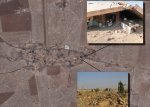Extremely. There is a high degree of autocracy within the Kurdish held areas and its been used to aggressively marginalize other Kurdish parties. All you need to do to see evidence of this is go to Erbil or Duhok and talk to the innumerable political exiles who are ostensibly part of the Kurdish National Council (KNC) and Kurdish Supreme Committee (KSC) but are either too afraid or unable to return.
And do you have any sources for this?
Also the Kurdish Supreme Committee is the legislature for Rojava. It was formed to unify the KNC and the PYD. It consists of equal members from each party.
The system of 'local democracy' is violently enforced with every other political party in Rojava being locked out,
What political parties would those be? I mean afterall they have all essentially declared support for the YPG and the YPJ
Five political parties in Rojava announce support for YPG and YPJ | ANHA
there is great liberality so long as you toe the official political line of the PYD (and consequently the PKK). There is obviously intense passion and good intentions within the PYD but it is wedded with a visceral intolerance for political opposition.
I dont think this is true at all.
"The ten members of the academic delegation who visited Rojava in December went with questions similar to mine: “Do its practices really constitute a revolution? Do they live up to its democratic ideals? What role do women actually play?” Upon their return, they made this public statement:
In Rojava, we believe, genuinely democratic structures have indeed been established. Not only is the system of government accountable to the people, but it springs out of new structures that make direct democracy possible: popular assemblies and democratic councils. Women participate on an equal footing with men at every level and also organize in autonomous councils, assemblies, and committees to address their specific concerns. . . . Rojava, we believe, points to an alternative future for Syria and the Middle East, a future where the peoples of different ethnic backgrounds and religions can live together, united by mutual tolerance and common institutions. Kurdish organizations have led the way, but they increasingly gain support from Arabs, Assyrians, and Chechens, who participate in their common system of self-government and organize autonomously.
The best hope for Syrian Kurdistan is that the Duhok Agreements will be upheld, that there will be a rapprochement between the Syrian Kurdish opposition and the PYD, and that real power-sharing resulting in free national elections and a Constitutional charter. Otherwise the moment the Syrian Civil War recedes you will have a Kurdish Civil War."
https://www.dissentmagazine.org/online_articles/the-revolution-in-rojava
"there are more than twenty political parties among the Kurdish and Christian people. The majority of them are in opposition to the PYD, the Tev-Dem and the DSA for their own reasons (a point I will come back to later on) as they do not want to join either Tev-Dam or the DSA. However, they have total freedom to carry out their activities without any restriction. The only thing they cannot have is fighters or militias under their own control.Our meeting with the opposition parties lasted for over two hours and the majority of them were present. We started by asking them how they got on with the PYD, DSA and Tev-Dem. Do they have freedom? Have any of their members or supporters been followed or arrested by the People's Defence Units (PDU) and Women's Defence Units (WDU)? Do they have freedom to organize people, demonstrate and organize other activities? Many more questions were asked. The answer to every single question was positive. No arrests were made, no restrictions on freedom or organizing demonstrations. But all of them shared the point that they do not want to take part in the DSA."
The experiment of West Kurdistan (Syrian Kurdistan) has proved that people can make changes - Anarkismo
"The autonomy and the administration of Rojava are based on the principle of direct democracy, "a democracy from the bottom up," as Cinak Sagli, member of the umbrella organization "Movement of Democratic Society» (Tev-Dem) describes it. This umbrella-organization was set up around the main political party of Rojava, the party of the Democratic Union (PYD) but brings people from many other political groups and works to put into practice the principles of democratic government and radical/participatory democracy in Rojava."
https://www.opendemocracy.net/arab-awakening/evangelos-aretaios/rojava-revolution.. “We all help in one way or another, one is fighting in the front, another is translating texts. But we are free to get organized in the Tev-Dem or not, there is no obligation and there is no social pressure to be part of it”, Judy told me while we were eating sweetmeats in a tiny pastry shop."
https://www.opendemocracy.net/arab-awakening/evangelos-aretaios/rojava-revolution
